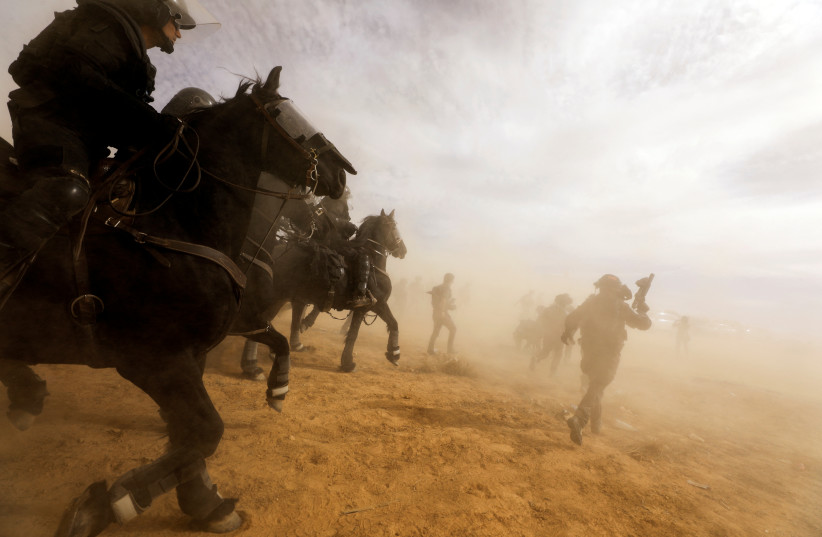Making the desert bloom and planting trees on Tu Bishvat (though perhaps not during a shmita year such as the current one) has long been the Israeli equivalent of America’s mother and apple pie.
Everyone loves it, everyone wants it. What could be bad?
It is for this reason that many Israelis were caught completely off guard by the brouhaha over Tu Bishvat tree planting this year in the Negev. A brouhaha that not only turned violent but also shook the coalition. Planting trees in the Negev – wasn’t that David Ben-Gurion’s dream?
Yet here we are: rocks hurled, arrests made, railroad tracks sabotaged, cars set alight, people injured.
The question in play is not whether Israel should make the Negev green with trees. The question is where those trees should be planted. It’s a big place, that Negev, made up of 12.2 million dunams. You want to make it bloom, make it bloom. But do you have to do it on the 5,000 dunams of land claimed by a Bedouin clan near the unrecognized Bedouin village of Sawa?
And that is the issue here: whose land is it?

Seventy-two years after the establishment of the state, and 48 years after a local Bedouin filed a claim to this particular plot of land, the issue has not been adequately adjudicated. And that is what is needed: the state, once and for all, has to determine whose land it is – who has ownership over nearly a million dunams of Negev land claimed by Bedouin.
If the courts rule that the Bedouin claims are adequate, then so be it. But if they determine that these claims, often based only on oral tradition, are not enough, and that the area is state land, then so be that as well.
The problem now is that the gray area has been allowed to last for too long, and various efforts in the past to resolve this issue have gone nowhere.
Since what is at issue is disputed ownership over land, have the courts decide, and then live by their decision. If the determination is that this particular plot of land belongs to the al-Atrash family, then let them plant their wheat there, as they recently did. If not, and the determination is that it is state land, then let the JNF plant as thick a forest as it wants at the site.
But decisions are needed, determinations must be made.
For too long, Israel has kicked the can down the road regarding Bedouin claims in the Negev. Why? Perhaps because it is a thick maze of competing oral claims and Ottoman, British and Israeli law. Or perhaps out of fear of rocking the boat, or just trying to keep things quiet. There is a certain logic to that, because if the courts would rule against the al-Atrash family, then surely there would be violent protests in the Negev. And who wants that, right?
Yet, as we have now seen, even if you don’t make an official determination, there could still be violent protests in the Negev. Avoidance of dealing head-on with complicated, emotion-laden issues does not make them go away.
Yet, as has been so highly evident in recent years, this is how the country has dealt with numerous issues, at enormous cost.
The country turned a blind eye to the way security inmates were running prisons, afraid to use a heavy hand for fear of inciting riots. It then woke up one morning to find six security prisoners had escaped from the Gilboa prison.
The country turned a blind eye to the inadequate security situation at the site of Rabbi Shimon Bar Yochai’s grave in Meron, not wanting to wade into byzantine battles regarding who controls the site. It then woke up one morning to find that 45 people were crushed to death there.
The country turned a blind eye to the massing of illegal weapons in the Arab sector, and woke up last year to a blizzard of shooting deaths.
The country turned a blind eye to autonomy that had developed in various haredi communities, and woke up during the start of corona to communities that were blatantly flouting the state’s rules and regulations.
Issues long ignored don’t just solve themselves. As the country again saw this week in the Negev, they tend to pop up and smack you in the face – often when you least expect it.
